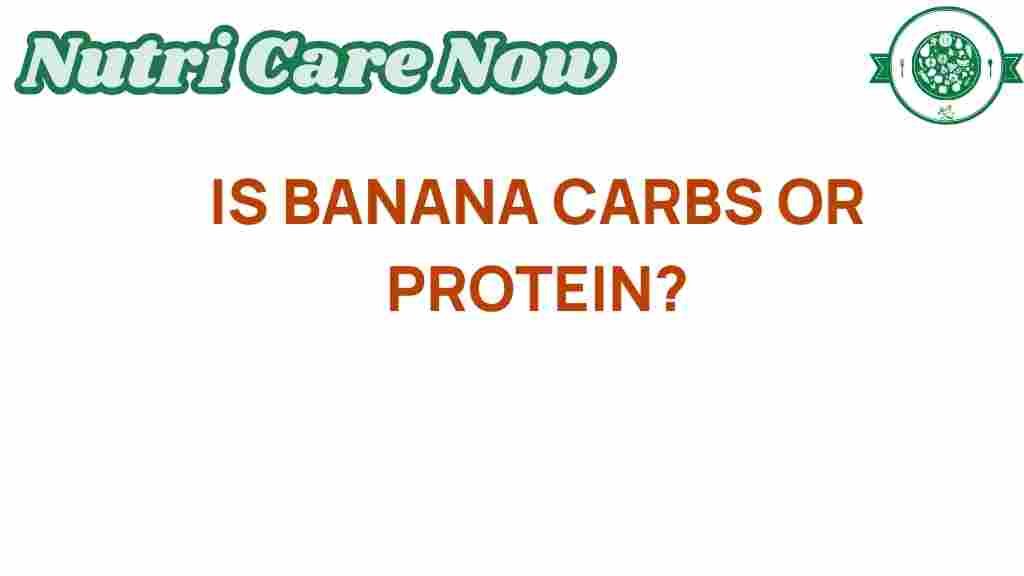Are Bananas a Source of Carbs or Protein? Unveiling the Truth about Banana Nutrition
Bananas are one of the most popular fruits consumed worldwide, often praised for their convenience and health benefits. But when it comes to banana nutrition, many people wonder: are bananas primarily a source of carbohydrates or protein? In this article, we will delve into the nutritional profile of bananas, exploring their carbohydrate and protein content, dietary benefits, and how they fit into a healthy eating plan.
The Nutritional Profile of Bananas
To understand whether bananas are a source of carbs or protein, we first need to look at their overall nutritional composition. A medium banana (approximately 118 grams) contains:
- Calories: 105
- Carbohydrates: 27 grams
- Protein: 1.3 grams
- Fat: 0.3 grams
- Fiber: 3.1 grams
- Sugars: 14 grams
- Vitamins and Minerals: Rich in Vitamin C, Vitamin B6, Potassium, and Magnesium
From this breakdown, it’s clear that bananas are significantly higher in carbohydrates than in protein. The primary carbohydrate in bananas comes from natural sugars and starches, making them a quick source of energy.
Understanding Carbohydrates in Bananas
Carbohydrates are essential for providing energy to our bodies. Here’s how the carbs in bananas contribute to your diet:
- Quick Energy Source: The natural sugars in bananas, primarily glucose, fructose, and sucrose, are rapidly absorbed, making bananas an excellent pre- or post-workout snack.
- Fiber Content: Bananas contain both soluble and insoluble fiber, which aids in digestion and helps maintain stable blood sugar levels.
- Low Glycemic Index: Despite their sweetness, bananas have a moderate glycemic index, making them a good choice for sustained energy without causing spikes in blood sugar.
The Role of Protein in Bananas
While bananas are not a significant source of protein, they do contain some protein, which contributes to overall nutrition. Here’s what you should know:
- Complete Proteins: Bananas lack some essential amino acids, which means they are not a complete protein source. However, they can complement other foods that are higher in protein.
- Protein and Satiety: Including bananas in meals that contain protein can enhance satiety, making you feel fuller for longer.
- Plant-Based Diets: For those following a plant-based diet, bananas can be a part of a balanced diet that includes various protein sources.
Health Benefits of Bananas
Incorporating bananas into your diet can provide numerous health benefits, especially when considering their carb and protein content:
- Heart Health: The high potassium content in bananas helps regulate blood pressure and supports heart health.
- Digestive Health: The fiber in bananas promotes digestive health and can help prevent constipation.
- Weight Management: Bananas are low in calories and fat, making them a healthy snack option that can help with weight management.
- Enhanced Mood: Bananas contain tryptophan, which the body converts into serotonin, potentially boosting your mood.
How to Incorporate Bananas into Your Diet
Here are some delicious and healthy ways to enjoy bananas:
- As a Snack: Eat them plain for a quick energy boost.
- In Smoothies: Blend bananas with other fruits, yogurt, and spinach for a nutritious smoothie.
- In Breakfast: Add sliced bananas to oatmeal or yogurt for added flavor and nutrition.
- Baking: Use mashed bananas in baking recipes like banana bread or muffins for natural sweetness.
Nutrition Science: The Impact of Bananas on Energy Levels
Bananas are often regarded as an ideal energy source, especially for athletes and active individuals. Here’s why:
- Instant Energy: The carbohydrate content provides an immediate source of energy, making them ideal for quick refueling.
- Electrolyte Balance: The potassium in bananas helps maintain electrolyte balance, which is crucial during physical activity.
- Muscle Recovery: Consuming bananas after exercise can help replenish glycogen stores and support muscle recovery.
Common Misconceptions about Bananas
Despite their popularity, there are some misconceptions about bananas that need clarification:
- Myth: Bananas are fattening. While bananas are higher in carbs, they are low in calories and can fit into a balanced diet.
- Myth: Eating bananas causes weight gain. Weight gain occurs from excessive calorie intake, not from eating bananas in moderation.
- Myth: Bananas are only for athletes. While they are great for energy, anyone can benefit from the nutritional value of bananas.
Potential Troubleshooting Tips
When incorporating bananas into your diet, you might encounter some challenges. Here are some tips to address them:
- Bananas Turning Brown: Store bananas in a cool, dry place and avoid refrigerating them to prevent browning.
- Ripening Too Quickly: If you want to slow down the ripening process, keep bananas separate from other fruits.
- Digestive Discomfort: If you experience bloating, try eating bananas in moderation and pair them with other foods that are easier to digest.
Conclusion: Bananas as a Key Component of Healthy Eating
In conclusion, while bananas are primarily a source of carbohydrates, they also provide some protein, making them a valuable addition to a balanced diet. Their numerous dietary benefits, including heart health, digestive support, and quick energy, highlight their role as a vital component of healthy eating. Whether you’re an athlete looking for a quick snack or simply someone who wants to add more nutritious options to their diet, bananas are an excellent choice.
For more information on healthy eating and nutrition science, check out this detailed guide on fruits and their benefits. Embrace the versatility of bananas and enjoy their delicious taste while reaping the rewards of their nutritional profile!
In summary, when considering banana nutrition, remember their primary role as an energy source filled with carbs, complemented by their modest protein content. Including bananas in your daily diet can be a delicious and effective way to maintain your energy levels and support your overall health.
This article is in the category Diet and created by NutriCareNow Team
